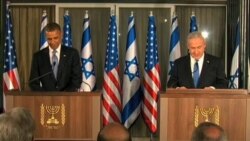JERUSALEM —
On the first day of President Barack Obama's visit to Israel, Iran's nuclear program and the civil war in Syria were major topics in talks with Israeli leaders, along with efforts to revive Israeli-Palestinian peace efforts.
What Israel and the United States see as the threat to Israel, the region and the world from Iran's nuclear program came up in the first round of talks, those between Obama and Israeli President Shimon Peres.
The issue carried over to President Obama's talks with Israeli Prime Minister Benjamin Netanyahu.
In a news conference, Obama said a diplomatic solution on Iran is preferable but, he said, he respects Israel's right to act on its own.
"The United States will continue to consult closely with Israel on next steps and I will repeat, all options are on the table, and we will do what is necessary to prevent Iran from getting the world's worst weapons," Obama said.
Netanyahu was asked about Obama's assurances on Iran.
"We have different vulnerabilities obviously and different capabilities. We take that into account. But what we do maintain, and I think the president is the first to do so, is that that Israel has a right to independently defend against any threat including the Iranian threat," Netanyahu said.
Talks also covered the civil war in Syria.
Obama said the U.S. and international partners are investigating whether chemical weapons have been used in the conflict.
"The broader point is that once we establish the facts, I have made clear that the use of chemical weapons is a game changer," Obama said.
Obama said he is skeptical of Assad government claims that rebels have used chemical weapons.
Obama's first day was not without lighter moments and informality. The president called the prime minister by his nickname "Bibi". Netanyahu called Obama by his first name.
Earlier, at the residence of Israeli President Peres, President Obama planted a tree similar to one at the White House. Israeli children waved American and Israeli flags, and sang to Obama.
On Thursday, President Obama meets Palestinian Authority President Mahmoud Abbas in the occupied West Bank.
What Israel and the United States see as the threat to Israel, the region and the world from Iran's nuclear program came up in the first round of talks, those between Obama and Israeli President Shimon Peres.
The issue carried over to President Obama's talks with Israeli Prime Minister Benjamin Netanyahu.
In a news conference, Obama said a diplomatic solution on Iran is preferable but, he said, he respects Israel's right to act on its own.
"The United States will continue to consult closely with Israel on next steps and I will repeat, all options are on the table, and we will do what is necessary to prevent Iran from getting the world's worst weapons," Obama said.
Netanyahu was asked about Obama's assurances on Iran.
"We have different vulnerabilities obviously and different capabilities. We take that into account. But what we do maintain, and I think the president is the first to do so, is that that Israel has a right to independently defend against any threat including the Iranian threat," Netanyahu said.
Talks also covered the civil war in Syria.
Obama said the U.S. and international partners are investigating whether chemical weapons have been used in the conflict.
"The broader point is that once we establish the facts, I have made clear that the use of chemical weapons is a game changer," Obama said.
Obama said he is skeptical of Assad government claims that rebels have used chemical weapons.
Obama's first day was not without lighter moments and informality. The president called the prime minister by his nickname "Bibi". Netanyahu called Obama by his first name.
Earlier, at the residence of Israeli President Peres, President Obama planted a tree similar to one at the White House. Israeli children waved American and Israeli flags, and sang to Obama.
On Thursday, President Obama meets Palestinian Authority President Mahmoud Abbas in the occupied West Bank.






